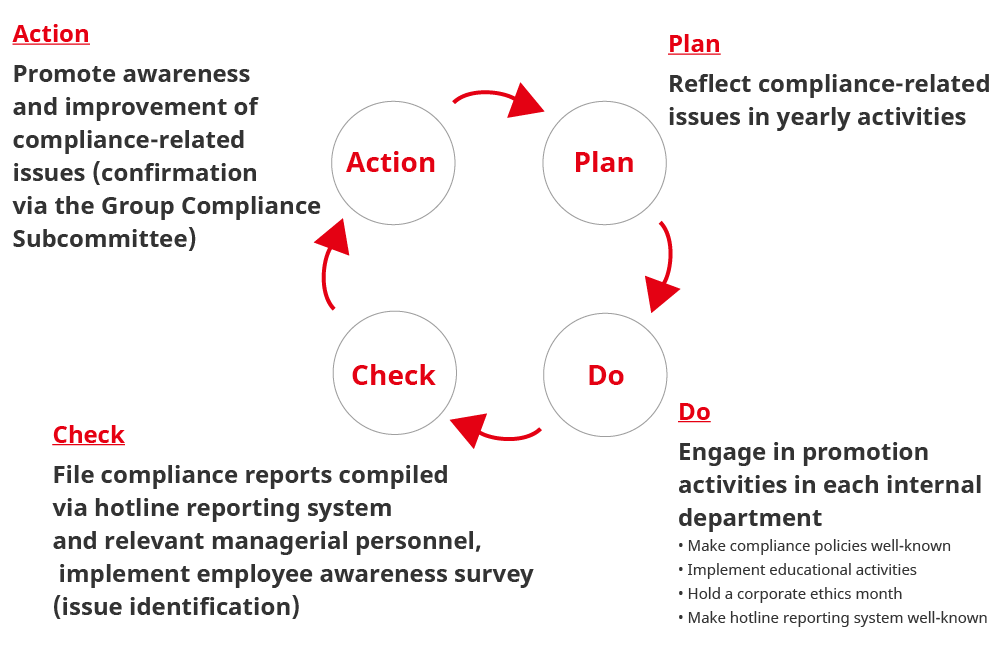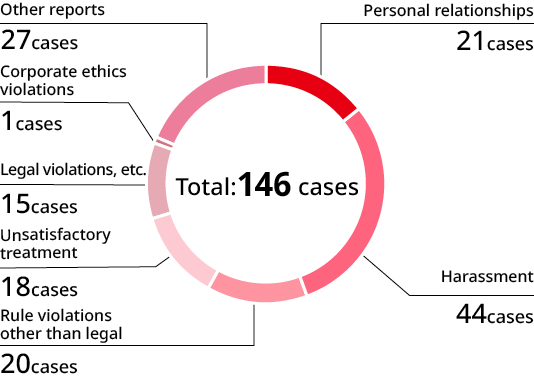Compliance
Basic Concept
Integrity represents the source of Teijin's compliance and serves as the most fundamental course of action. To ensure that our business activities are carried out with integrity, we rigorously promote the practical application of our Code of Conduct as the Code of Corporate Ethics, under the supervision of the Board of Directors. In addition to complying with laws and regulations, we require our corporate officers and employees to act with integrity and in accordance with social norms, based on the concept that promoting compliance is essential for creating a sound corporate culture. To that end, we ensure that the Company's corporate officers, starting with the representative directors, lead by example in this regard. At the same time, we provide compliance-related education and awareness activities to the corporate officers and employees of the Company and its subsidiaries. In these ways, we aim to increase shareholder value and enhance the level of employee satisfaction by fostering a corporate culture that respects honest behavior.
Compliance Promotion Structure
The Group Compliance Subcommittee was established and chaired by the general manager of the Sustainability Development and Engagement Department and is composed of managers from the compliance departments of each business unit. Confirmation on the status of compliance promotion in each department within the Group is done through this subcommittee. We also appoint Compliance Risk Management Promotion Managers in each business and at each Group company to encourage the implementation of compliance-related activities. In addition, we appoint Compliance Managers at regional headquarters to assist in promoting compliance-related activities in accordance with regional characteristics. Under these structures, we verify compliance-related issues in each department within the Group through compliance reports compiled from the hotline reporting system, relevant managerial personnel, and employee awareness surveys. To address the issues identified through these means, we incorporate compliance-related education and awareness activities within the compliance promotion plans of each Group department. By putting such a PDCA cycle into motion within our compliance promotion structure, we are able to ensure sustainable adherence to compliance, and conduct regular evaluation and improvement activities. In this manner, we are working to enhance compliance awareness throughout our organization, foster a corporate culture of adherence to laws and regulations, and minimize compliance-related risks.

Main Compliance Promotion Activities
We feel that promoting compliance is essential for creating a sound corporate culture. Given this, we are engaging in the following initiatives to not only ensure adherence to internal rules and laws relevant to our business, but also to promote a thorough awareness of corporate ethics.
Spreading awareness about our Code of Conduct
We distribute our corporate ethics handbook to all employees, translated into multiple languages so that all Group employees around the world can understand our Code of Conduct. In addition, we produce educational videos with subtitles in various languages and disseminate them to all Group companies.
Tax policy of the Teijin Group
In order to comply with laws and regulations regarding the tax practices of the countries, regions and multilaterals in which the Teijin Group operate, we have established a tax policy as a basic standard for taxation in April, 2022. By paying taxes appropriately in accordance with this policy, we aim to perform our social responsibilities and become a corporate group that can gain the understanding and sympathy of society at large while at the same time striving to increase our corporate value.
Workshops for all employees during Corporate Ethics Month
The Teijin Group has designated October as our annual Corporate Ethics Month. During this month, training is conducted targeting all executives and employees (including contract / temporary employees) regarding important compliance-related issues.
Implementation of an employee awareness survey
We implement an employee awareness survey every year to assess the level of compliance awareness among Teijin Group corporate officers and employees in each country, and to reflect relevant feedback in future compliance promotion activities. In fiscal 2023, the survey targeted 19,765 personnel, 61% of which provided responses.
Operating a hotline reporting system

We operate a hotline reporting system that enables Group corporate officers, employees, and business partners to directly report any illegal conduct or conduct that goes against our corporate values that occur within the Group. The Compliance and Risk Management Department serves as the secretariat and handles reports. The reporting channels are operated by an independent third party, allowing anonymous and multilingual reporting 24/7. Without the consent of the person consulting or reporting, the contents of the consultation or report will not be disclosed to other executives or employees, and any adverse treatment of the reporter is strictly prohibited. Information related to received consultations and reports is kept confidential and managed appropriately. The necessity and usage of the hotline are communicated to employees through various training sessions, and the investigation process for reported breaches is stipulated in the "Rules for the Teijin Group's Whistle-Blowing" and shared within the company. Additionally, the Code of Conduct specifies protection against actions aimed at identifying the whistleblower or retaliatory harassment against them.
Reports of conduct that could present a major risk are reported to upper management, who responds to these allegations accordingly. In addition, information on reports of issues that have been addressed are disclosed to employees twice a year via the Company's intranet while giving proper consideration to privacy. This in turn helps raise employee awareness. Furthermore, the operational status of the internal whistleblowing system is reported to the Board of Directors on a regular basis, so that they can provide relevant supervision.
Breaches in FY2023
The number of reports received through internal whistleblowing and managerial report cases in FY 2023, which were found to be breaches of the code after investigation and for which appropriate measures were taken, is as follows:
| Corruption, fraud, or bribery | 2 |
| Discrimination or harassment | 3 |
| Violation or leakage of customer information | 0 |
| Conflict of interest | 0 |
| Money laundering or insider trading | 0 |
| Other | 26 |
| Total | 31 |
Initiatives to Combat Corruption
We established the Teijin Group Anti-Corruption Policy under which we lay out procedures and establish the framework for preventing corruption. In addition, we have formulated conduct guidelines for preventing corruption and work to ensure that our corporate officers and employees rigorously adhere to these guidelines.
Additionally, we have established the "Rules on Anti-bribery of Public Officials" as internal regulations, prohibiting any entertainment or gifts to public officials with improper intent. When providing entertainment or gifts to public officials that do not constitute bribery, it is necessary to obtain prior written approval from the responsible person in accordance with the "Guidelines for Provision of Favor to Public Officials."
The rules also stipulate reporting obligations, investigations, and corrective measures in response to violations, as well as disciplinary actions for breaches. Strict disciplinary actions will be taken against executives and employees involved in corruption, regardless of their position.
We conduct due diligence to confirm the validity of transactions with sales agents, suppliers, and other parties to prevent corruption occurring through transactions with business partners. We also engage in due diligence regarding corruption risks at partner companies acquired through M&A.In particular, when starting or continuing the appointment of a sales agent, we confirm corruption risks based on a checklist (confirming presence/absence of items such as special interests with public officials, past corruption, capabilities to perform duties, and claims for unaccounted-for expenditures) and require that the sales agent sign an anti-corruption oath. We clearly communicate our CSR Procurement Guidelines, including the prohibition of bribery, to our suppliers and request their thorough adherence to these guidelines. We also enact measures toward transactions with suppliers that have contributed to corrupt behavior, including the suspension of transactions with such suppliers for a set period of time. We conduct assessments targeting each business and business site of each Teijin Group company in order to clarify the exposure to the risk of corruption throughout the entire Group. The results did not identify any business or site with significant corruption risks. For businesses that deal with public institutions including governmental organizations, however, it was recommended that development of management systems and appropriate regular trainings be conducted, preferably in accordance with Teijin Limited fundamental policies, and taking into consideration local rules, regulations, and social norms of the site of the business. Going forward, we will appropriately address any corruption-related risks at each business and business site following the results of the risk assessment. We implement anti-corruption e-learning for officers and employees responsible for operations such as sales, procurement, and collaboration with other companies at each business and business site of each Teijin Group company. We will implement internal audits and risk assessment surveys on a regular basis as we work to set in motion a PDCA cycle to continue to combat corruption. In addition, we are committed to the regular implementation of compliance education and training regarding anti-corruption within the Teijin Group. We will also promote the extensive use of the internal reporting system and consultation hotlines when employees face risks such as bribery. We are also taking measures such as promoting awareness of reporting systems for outside business suppliers.Management of corruption risks at our business partners
Risk assessment
Educational activities
Future issues
Continued Operation and Strengthening of the Security Export Control System
For the Teijin Group, whose business is expanding globally, compliance with laws and a fully functioning security export control system are vitally important. In light of this, we have established the Group Security Export Control Regulations governing the corresponding Security Export Control Regulations and Detailed Implementation Rules, which apply to each Group company that conducts exports. We implement this via a dual-level control system, placing specialist back-office staff at the head office and business units to ensure a highly reliable level of security export control.
The laws that must be complied with in security export control are frequently amended, so an important factor in training activities is to ensure high levels of awareness and thoroughness within the business units in regard to the latest information. In this regard, we conduct regular training and promote skills development of employees by encouraging them to sit external practical skills certification exams.
